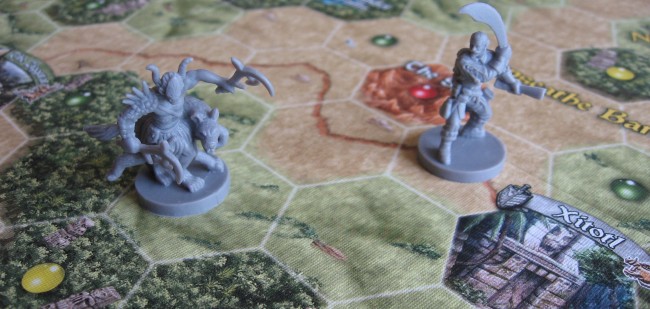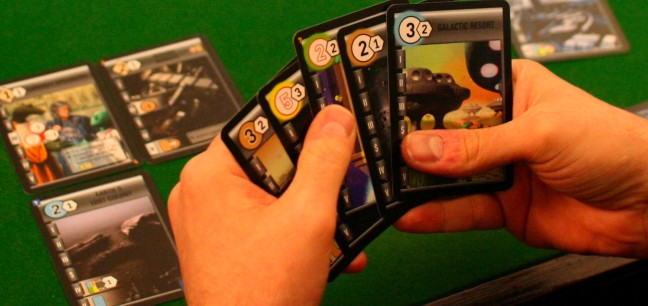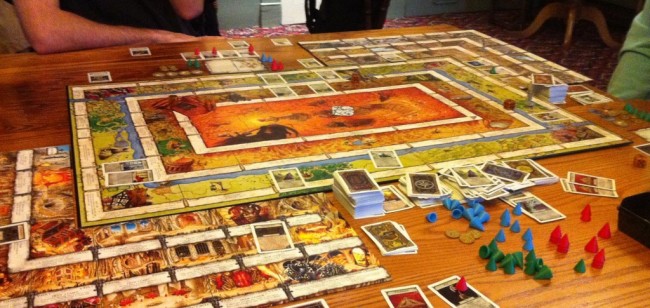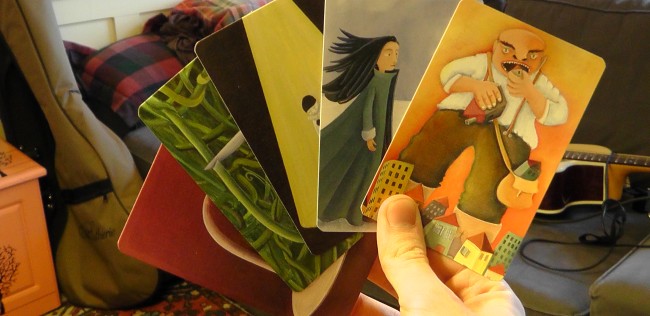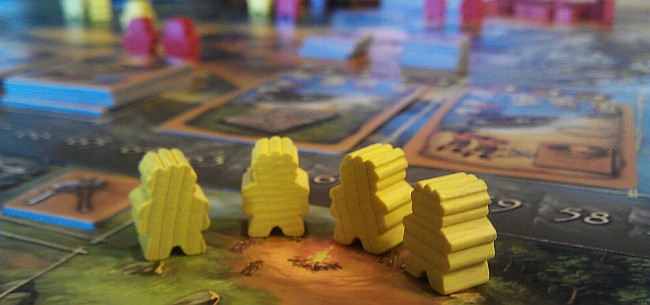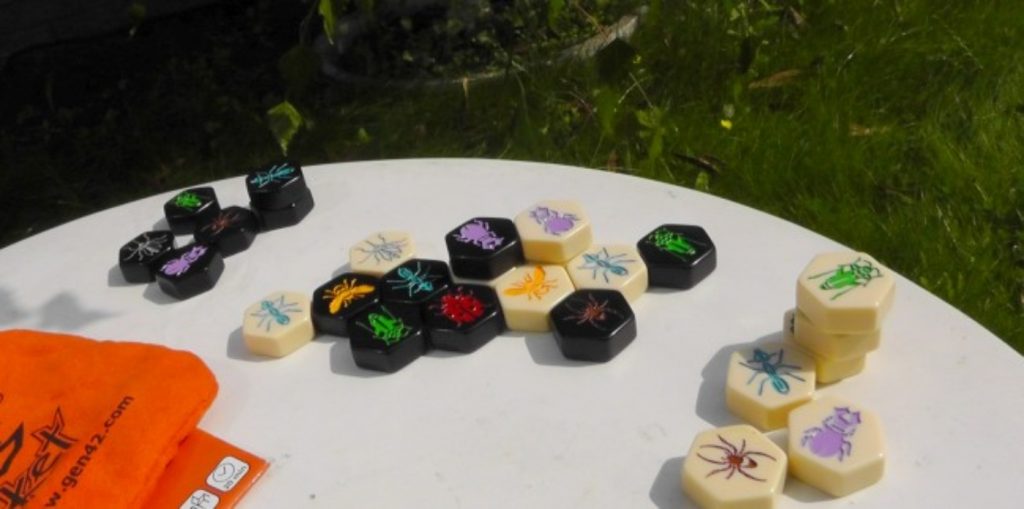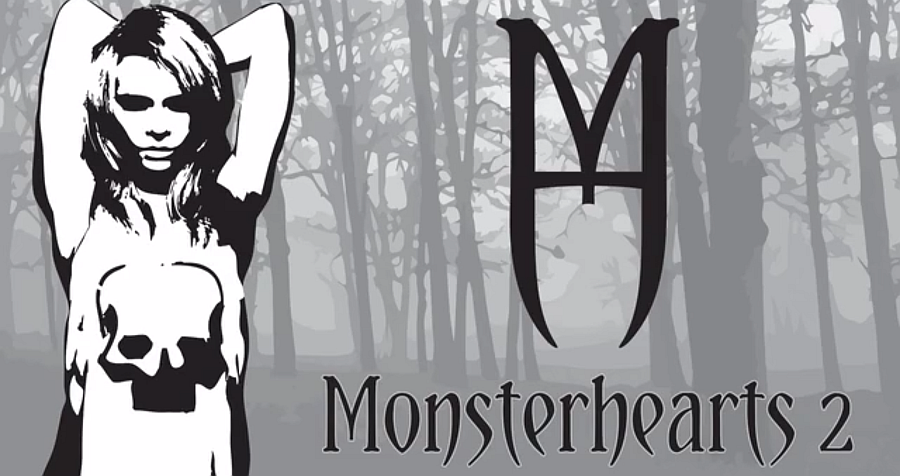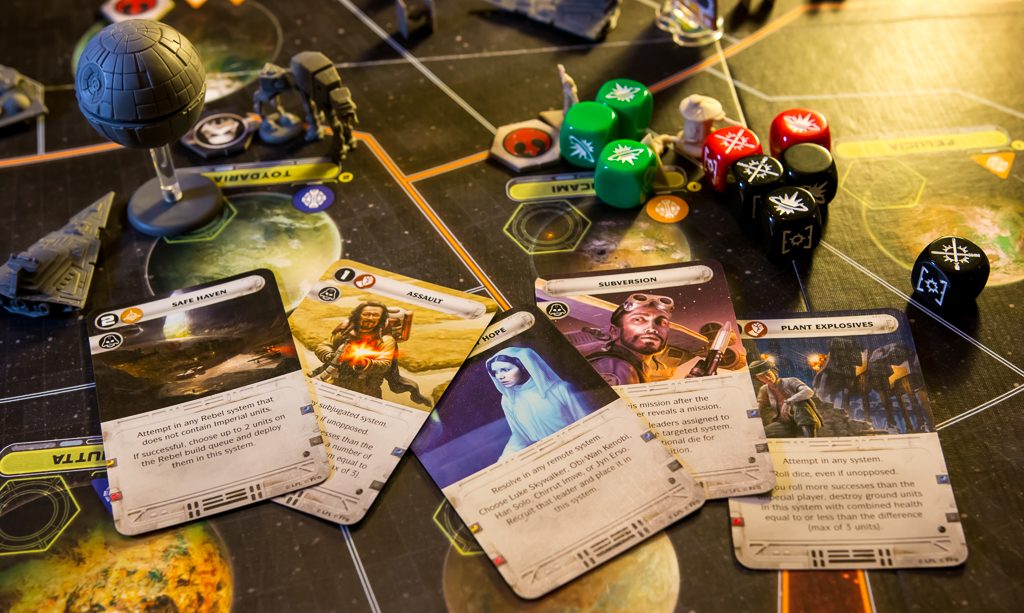Quinns: There’s a WAR ON here at SU&SD. A disagreement of olympic proportions. You see, I think board games should be about interacting with one another, and Paul is an asshole. I’ll let him explain.
Paul: Quinns is not a fan of certain kinds of games. Worker placement games, games where the players are a bit more independent, or games where players are otherwise free to act without having to worry about one another. You know, all those great games like Runebound and Agricola, and a while ago he got mad at Stone Age. All those well-lived, charming, innovative games that are adored by millions. He’s going to try to explain why and he’ll flap more than an army of penguins. Watch.
Quinns: Oh, I’ll state my case, alright. Games “where the players are a bit more independent” is a cute euphemism. What we’re talking about here are games that don’t see the players interacting.
Games where, fundamentally, each player is off in their own world, worrying about their own problems, and not in anything resembling dynamic conflict or co-operation with their friends. I find them dull. But I’d go further than that. I’d actually call them failures of design.
Paul: Okay. When we talked about this before you raised some good points about how lots of games don’t actually see the players interacting directly. But the thing is, we don’t always have to be on each other’s backs in games. We don’t need everything we play to have intimately interlinked us at each and every turn. Board games are about us coming together and enjoying ourselves. Isn’t it possible that some gamers out there don’t want all these experiences to be ones of direct conflict?
We, as people, get together to do lots of things. If we sit down and watch a film, or a TV show, or have dinner, or all these other social things we enjoy, we don’t necessarily have to have our own personal experiences directly interlinked to what everyone else is up to, do we? We don’t all have to eat off the same plate, but we can still enjoy our experience together. Get me? And is it me or are you already EDITING THE PARAGRAPH ABOVE?
Quinns: Just fixing your ENDLESS TYPOS. Anyway, that’s just it. Board gaming is obviously a social hobby, and my problem with solitaire multiplayer games is that they’re actively antisocial. I have no problem with being sat around a table, a drink in one hand, or perhaps both hands, just talking with my friends. But when you’re playing Agricola you’re not even doing that for half the time. The game has you all staring at your own private board, doing your own calculations. Agricola is obviously a rich and fascinating game, but it doesn’t break down walls between people. It builds them.
Paul: I know you have no problem with having a drink in both hands. But Agricola is all about reacting, responding, timing and picking your moment, one careful move at a time. It’s almost chesslike. It’s a game where you cut other people off, beat them to a key resource, diversify your options and use all your guile so that you’re ready to make do with whatever cheap farming goods you’re able to bring home that seas-
Quinns: BLAH BLAH BLAH-
Paul: THAT SEASON DO NOT INTERRUPT-
Quinns: You don’t need to explain to me why Agricola is a good game. You need to explain to me-
Paul: How to dress in the morning, I know.
Quinns: YOU NEED TO EXPLAIN TO ME why, when you’re surrounded by people you like, you’d want to engage in an activity where for the most part any player’s moves are uninteresting to the rest of the table. It’s inarguable that in Agricola or Dungeon Lords you’re often only half listening when the player sat furthest from you announces what they’re building, a degree of attention usually reserved for family dinners where you know you’re safe in not paying attention as your aging aunt whinges about her back or crack or carbuncles or whatever. I never want to be uninterested in my friends and family. Ever. I certainly don’t want to pay for the privilege.
But let’s move this argument into stormier seas. Let’s hear your defense of Runebound or Talisman, games where all the players are traveling around a board and defeating things in an attempt to gain magical items and experience the fastest. More importantly, unlike Agricola, these are games that so divorce you from one another that you could play alone and have almost exactly the same adventure.
Paul: Adventuring! Now there’s a glorious thing. All of you dashing across the dangerous lands of Terenoth, or Talismanland, or whatever. Questing, fighting monsters, drinking ale, climbing mountains and going to the toilet in bushes. You’re all racing each other, sharing stories, laughing at each other’s defeats and either cheering or booing their victories, you grow powerful, or you grow jealous. You plot revenge and then you execute that revenge. “I’M COMIN’ AFTER YOU, MILLICENT!” you roar, as you chase her Dwarf through the Forests of Hamildorf, waving your Axe of Cleaving +6/+5/+4. Bloody Millicent. If that’s not a group of people around a table having fun, then, well…
Quinns: …
Paul: Okay, you know what? I’ll tell you something. I’ll tell you about some games that you like. You like some games called Dominion and Race for the Galaxy. Tell me about what makes those different to the games you described. Tell me about the interaction in those, Mister Line-of-Anime-Character-Dots-Representing-Silence. Fits, I guess. You do have messy anime hair.
Quinns: Get out of town. Race for the Galaxy, like Seven Wonders, is a card game where any decision you make is 50% based on what your opponents have built. If you notice that your opponents have gone for trading strategies, you start dropping production worlds into your tableaux to cling onto the coat tails of their plans. And watching your opponents like hawks is often rewarded in other, instantaneous ways. You can almost hear the crunching sound when you trigger a production phase when your opponents’ factories are already full.
Tell me, exactly, how watching my friends like a hawk is going to help me in a game of Talisman.
Paul: Are you kidding. Are you actually kidding. Is there a hidden camera in here. What have you done with Quinns.
Quinns: …
Paul: STOP DOING THAT.
In Talisman you watch your other players like a hawk because you get to see their own stories unfold. This is nonetheless an experience you’re all sharing, writing your own chapters, waiting for your stories to intersect, perhaps in mutual respect, perhaps in bitter, sour rivalry, or perhaps in one of you “accidentally” knocking the board off the table if you’re playing endless first edition Talisman.
More generally though, in games with less interaction you watch your opponents to learn from what they do. Like in Dominion. That game you enjoy. You remember Dominion?
Quinns: Sure, sure. I’d agree that there are indeed a few limp, unconvincing reasons to let your gaze settle on one of your friends like a pigeon on a clothesline.
But I mentioned above that I actually consider these games a failure of design. You yourself mentioned in our Dixit review… hang on, let me find the quote
Paul: Go on, flap away, penguin-man. Fly! Fly like the wind!
Quinns: “It’s so fantastic when board game designers try and experiment with what can be achieved with a group of people sat around a table. It’s not just that we have brains, personalities and imaginations. We love to use them as weapons…
Dixit is one of those very special game ideas that makes the most of the human brain while also keeping its rules to a minimum.”
…and I totally agree with that. The art of designing a table game is at its most beautiful and powerful when it simply presents its players with a fascinating, new environment in which to interact. Games that don’t see the players interacting, games that could be played solo without cutting out the heart of the challenge, don’t make use of the single most exciting resource available to any board game designer – the players themselves. We’re where the stories, the intrigue and excitement will come from. Everything else is maths. This is why James Bond plays poker and not sudoku.
Paul: How do you feel, then, about Monopoly? After all, that’s a game where you’re all directly interacting, each of you manipulating an environment that you all share. Is that a more interesting game for you than Talisman, or Stone Age, or Agricola?
Quinns: Haha. It’s like watching a cat try and catch a beam of light. OBVIOUSLY I’m not saying that all games that feature conflict are better than all games that don’t. Although, aha, I will say that I find the auction mechanic in Monopoly – the only part of it that sees the players in direct conflict – the single best, most exciting part of it.
Paul: So then, there’s more to game than just interactong, or conflict-
Quinns: You wrote interactong up there. I don’t know if that was deliberate. Was it deliberate?
Paul: I was distracted by this funny beam of light darting across the wall. What I was going to say is that obviously player interaction isn’t a binary thing, and that it’s possible to have different degrees of it in a game. Maybe some of us simply want more or less of that aspect in our games? Perhaps you want x amount of that, while other gamers are happy with less? Or prefer the dynamics of something like Agricola rather than something where we’re all very tightly interlinked at all times, like Citadels? Is this a discussion we can even resolve, or is it really about personal preference?
Quinns: It is, of course. But you know what bugs me about games with minimal player interaction, regardless of personal taste? We started this site to get more people into board gaming, because it’s not at all the dismal, childish thing people have in their heads. Right?
To me, this hobby is never more tepid and geeky than when you’re sat around a table and playing a game that doesn’t encourage you to talk, laugh, or otherwise bring you into contact; when a game simply presents each of you with the same challenge and says that whoever does it best, wins. To me, it’s only in those occasions that this hobby starts to resemble the stereotype non-gamers have in their heads.
Paul: Hm. Yet in my experience, all sorts of gamers are playing these games. Just because the dynamics are less “social”, it doesn’t necessarily mean the gamers are. Or the experience. This could be a debate that’d go on for a while. Our readers might well have some interesting things to say in their comments below, which is great because we probably have the smartest readers around. That’s definitely not a sycophantic appeal for comments and responses to what we’ve been talking about here, though.
Quinns: I’m expecting to get slaughtered in the comments, but we’ll see.
Paul: Well, I actually think you’ve made some really interesting points and that this is something that deserves to be talked about. Sure, it might be an issue of preference, but it’s still something worth having a debate about. Plus, if it turns out you do have a minority opinion, so what? It’s a sad world where everyone agrees all the time.
Quinns: Agreed.


